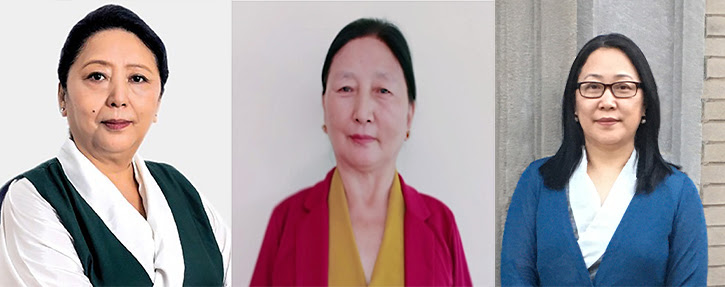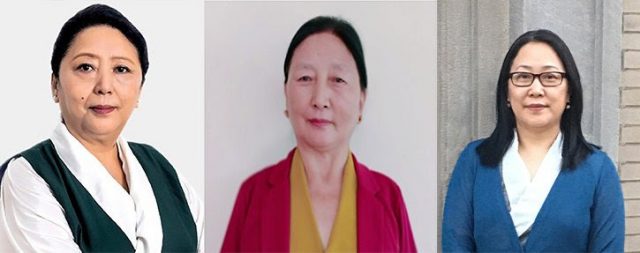
Kalons approved by the 17th Tibetan Parliament: Ms Dolma Gyari, Ms Tharlam Dolma, and Ms Norzin Dolma.
By — Shyamal Sinha
Women empowerment helps in boosting the status of women through literacy, education, training and awareness creation. Furthermore, women’s empowerment refers to women’s ability to make strategic life choices which had been previously denied them.
Nations, businesses, communities and groups may benefit from the implementation of programs and policies that adopt the notion of female empowerment. Empowerment of women enhances the quality and the quantity of human resources available for development.
The first session of the 17th Tibetan Parliament-in-Exile approved three women nominated by Sikyong Penpa Tsering as Kalons of the 16th Kashag. The three women namely Kasur Dolma Gyari, Chisur Tharlam Dolma, and Norzin Dolma were approved as Kalons following a majority vote based on 50% or more approval on the floor of the Tibetan Parliament on Monday, 11 October.
Kasur Dolma Gyari received a total of 30 votes while Tharlam Dolma and Norzin Dolma received 27 votes each from the 45-seat Tibetan Parliament.
Find below brief biographies of the three Kalons approved by the 17th Tibetan Parliament-in-Exile.
Brief Biography of Dolma Gyari
 Kasur Gyari Dolma completed her school from CST Darjeeling in 1981. She received her BA degree from Panjab University in Chandigarh in 1985. She pursued B.A LL.B from Delhi University’s prestigious Faculty of Law from 1985 – 1988.
Kasur Gyari Dolma completed her school from CST Darjeeling in 1981. She received her BA degree from Panjab University in Chandigarh in 1985. She pursued B.A LL.B from Delhi University’s prestigious Faculty of Law from 1985 – 1988.
At school, she was a recipient of the Best Girl award conferred by the Department of Education. She also founded a student organisation for social service and served as its founding president. This was the first Tibetan student-led organisation dedicated towards student welfare and co-operation. In college, she served as the president of Foreign Students Association of Government College for Girls, Panjab University. She was also a board member of the regional Tibetan Youth Congress at the time. During her student days in Delhi, she established contacts with the youth leagues of various Indian political parties and began the celebration of Tibet Day in Indian colleges.
From 1986 – 1991, she served as member of the central executive committee of the Tibetan Youth Congress (TYC). She also served as an advisor to the Regional Tibetan Women’s Association (RTWA) of Delhi and the central Tibetan Women’s Association in Dharamshala, along with many other non-governmental responsibilities.
In 1991, following the democratisation of the Tibetan Parliament by His Holiness the Dalai Lama, she was elected to the 11th Tibetan Parliament-in-Exile (then known as Association of Tibetan People’s Deputies). At the age of 26, she was the youngest person to be elected to the Tibetan Parliament. Since then, she has been elected to the 12th, 13th and 14th Tibetan Parliament-in-Exile as one of the representatives from Dotoe province. She is also the first female Deputy Speaker of the Tibetan Parliament in-Exile and served in that role for two consecutive terms in the 13th and 14th Tibetan Parliament-in-Exile.
From 2011 – 2016, she served as Kalon for the Department of Home in the 14th Kashag. She was also one of the candidates for the Kalon Tripa elections in 2011 and the Sikyong elections in 2021.
Brief Biography of Tharlam Dolma Changra
 Former Parliamentarian Changra Tharlam Dolma completed her schooling from Gangtok, Bylakuppe, and Nirmala Convent school in Mysore. She received her Bachelor of Arts degree from Teresian College, and Master of Arts (Economics) from Mysore University in 1975. She completed her B.Ed degree from St. Joseph’s in Mysore.
Former Parliamentarian Changra Tharlam Dolma completed her schooling from Gangtok, Bylakuppe, and Nirmala Convent school in Mysore. She received her Bachelor of Arts degree from Teresian College, and Master of Arts (Economics) from Mysore University in 1975. She completed her B.Ed degree from St. Joseph’s in Mysore.
Professional Experience:
Tharlma Dolma has served for over 37 years in Tibetan schools including 14 years as teacher in both primary and senior secondary schools. From 1991 – 94, she served as the principal of CST Dalhousie, and from 1994 – 2003, and again from 2005 – 2009, she served as the Principal of CST Bylakuppe. From 2009 – 2010, she served as the Principal of CVP school in Dekyi Larso, Bylakuppe. From 2003 – 2005, and again from 2010 – 2013, she served as the principal of CST Mundgod. She retired from active service in 2013.
Tharlam Dolma also served as the Core committee member of the regional Tibetan Women’s Association of Bylakuppe, and as board member of Dalhousie Public School and Dalhousie Hill Top School. In 2013, she received the prestigious National Award for Teachers from President Abdul Kalam.
From 2011, she is a member of the Department of Education’s Education Council and Advisory Committee, and is also a governing council member of Dalai Lama institute based in Bengaluru.
Brief Biography of Norzin Dolma:
 Born in Kollegal on 28 November 1975 and currently based in New York, Norzin Dolma began her education at CST Kollegal and CST Shimla. She holds a BA in English, History, and Sociology from Teresian College and an MA in English Literature from Mysore University, India. Under the Tibetan Scholarship Program, she earned an MA in Law and Diplomacy (MALD), focusing on international organization and international negotiation & conflict resolution from Fletcher School, Tufts University, USA, with cross-registration from Harvard University’s GSAS and KSG. Later, she also obtained a BA in Library and Information Science from Mysore University.
Born in Kollegal on 28 November 1975 and currently based in New York, Norzin Dolma began her education at CST Kollegal and CST Shimla. She holds a BA in English, History, and Sociology from Teresian College and an MA in English Literature from Mysore University, India. Under the Tibetan Scholarship Program, she earned an MA in Law and Diplomacy (MALD), focusing on international organization and international negotiation & conflict resolution from Fletcher School, Tufts University, USA, with cross-registration from Harvard University’s GSAS and KSG. Later, she also obtained a BA in Library and Information Science from Mysore University.
She has consistently received prizes and awards for academic excellence, including All-Mysore Iyengar Memorial Award, Mother Euphrasia Award, and Tauro Memorial Award.
Norzin previously worked as a research officer, senior program officer, acting executive director, and board of director at Tibetan Center for Human Rights and Democracy (TCHRD). After her US education, she returned to India and served as the head of UN, EU & Human Rights Desk at CTA’s Department of Information and International Relations (DIIR). She later worked as a development officer at The Tibet Fund (TTF), New York.
She has advocated Tibet issues at international conferences, including the 59th and 61st sessions of the United Nations Commission on Human Rights, Geneva; World Social Forum, Mumbai; UN-Civil Society Relations, Bangkok; and World Summit on Sustainable Development conferences, Bali and Johannesburg. Norzin has authored and edited books and reports, including 2008 Uprising in Tibet: Chronology and Analysis (DIIR 2009), Unjust Sentencing of Tulku Tenzin Delek (TCHRD 2004), Destruction of Serthar Institute (TCHRD 2002), 35 Years: Special Report (TTF 2015), and Nepal Earthquake: Rebuilding Efforts in Tibetan Community (TTF 2016).
Political empowerment supports creating policies that would best support gender equality and agency for women in both the public and private spheres.












